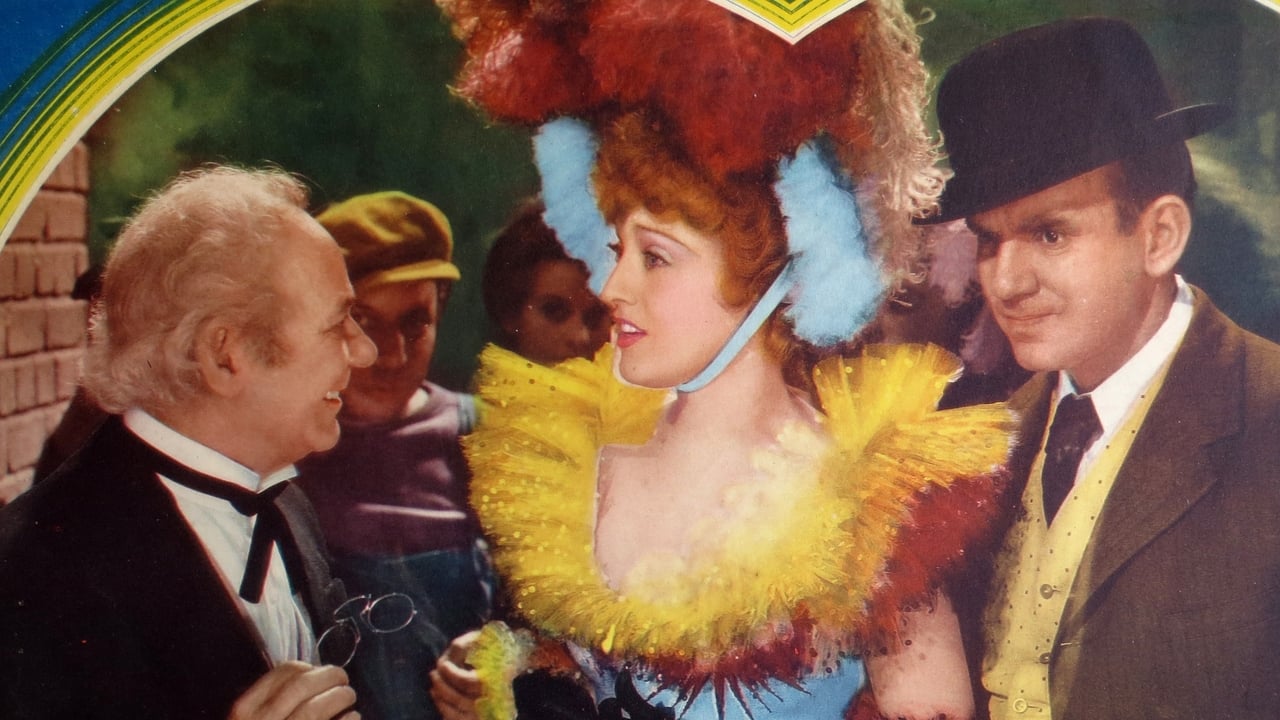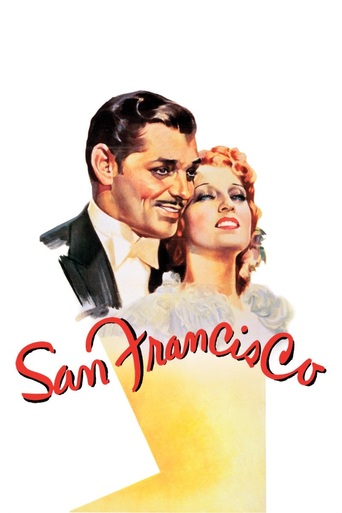

Slow pace in the most part of the movie.
... View Morerecommended
... View MoreIt's no definitive masterpiece but it's damn close.
... View MoreEach character in this movie — down to the smallest one — is an individual rather than a type, prone to spontaneous changes of mood and sometimes amusing outbursts of pettiness or ill humor.
... View MoreBlackie Norton is an atheist who runs an establishment catering to vices such as drinking, gambling, and ogling pretty women. However, we also see that he has a good heart underlying his sneering façade. Tim tells Mary about Blackie's good heart, saying in general that no one is all bad, an absurdity on which I will not bother to comment. The important thing about this conversation he has with Mary in this regard, however, is the smug know-it-all look he has on his face, which only gets worse as the movie wears on. A lot of people suppose that belief in God and moral goodness are linked together in some essential way, and this was especially true in 1936, when this movie was made. Therefore, Blackie's atheism in conjunction with his good heart, we are being guided to believe, is unsustainable.Early in the movie, we see Blackie and Tim in the boxing ring, in which Tim knocks Blackie to the mat, as he usually does, according to Blackie. It is important to establish that Tim can lick Blackie in a fight, because later in the movie, when Blackie and Tim are arguing over Mary, Blackie punches Tim, who just stands there and takes it with a hurt look on his face, the blood trickling down from his lip. In other words, Tim is turning the other cheek in spite of his superior ability at fisticuffs. If the movie had not featured that boxing scene early on, we might suppose that Tim's reluctance to strike back is out of cowardice and weakness, that he is hiding behind his collar.Though Mary loves Blackie, yet it bothers her that he doesn't believe in God. Blackie responds, "God? Hey, isn't he supposed to be taking care of the suckers that come out of the missions looking for something to eat and a place to sleep?" Some might answer that it is God that inspires the people that run the missions. But as Mark Twain once noted, "If you will look at the matter rationally and without prejudice, the proper place to hunt for the facts of His mercy, is not where man does the mercies and He collects the praise, but in those regions where He has the field to Himself."This challenge returns to us toward the end of the movie where God indeed has the field to Himself. In other words, when the earthquake begins, God does nothing to prevent it, and the result is that many people die or suffer crippling injuries. As Blackie wanders around looking for Mary, he keeps running into people looking for God. The mother of the man whom Mary was planning to marry says of her son's death that it is God's will and that it's God's help they both need now. This brings out the great paradox regarding the connection between religion and suffering. The more suffering people experience, the more likely they are to turn to God. And yet, the more suffering people experience, the more we wonder why an all-powerful, loving God would allow it.Eventually, Blackie finds a place where the injured are being cared for, where Tim is offering them comfort. One might expect that in the face of all the death and destruction that has befallen the city, Tim would look as grief stricken and overwhelmed as everyone else including Blackie. But no, Tim has a look of serenity on his face when Blackie sees him, and that look stays on his face right through the end of the movie. Earlier in the movie, when the Barbary Coast was indulging in all its wantonness—drinking, gambling, carousing—Tim's facial expression was often grim and disapproving. But now, with all the misery and suffering around him, Tim is in his element. As the city burns, as people die before his eyes, as he hears people cry out for the loss of their loved ones, Tim is truly at peace. This is especially so when he sees Blackie. Now, at last, Blackie will see. There must be a God after all."Wait a minute!" you say. "How does this prove the existence of God?" Well, actually what it proves is that people need God. And if people need God, then they need priests like Tim. For years, Tim had to endure all of Blackie's scoffing and sneering, but now the day of triumph is at hand. Blackie is truly humbled, confused by all the suffering and misery that he does not comprehend, as he stands before Tim, who has known all along that this day would come, and whose heart is filled with joy.When Blackie asks Tim if he has seen Mary, Tim takes him to a place outdoors where survivors of the earthquake have found refuge. There is Mary, singing "Nearer My God to Thee," accompanied by those around her, while a mother holds her dead child in her arms until others gently take him away from her and she collapses in tears. It is all so heavenly.When Blackie sees Mary, he says to Tim, "I want to thank God." And then we see it, the spectacle that exceeds even the earthquake: Blackie Norton, on his knees, tears in his eyes, giving thanks to God, while Tim looks on smiling sweetly.When Mary sees Blackie on his knees in prayer, she comes to him, and now we know that Blackie will finally have Mary's love. Just then, someone yells that the fire is out, at which point everyone becomes happy, shouting that they will rebuild San Francisco, marching over the hill, back to the city, as they sing "The Battle Hymn of the Republic." When you consider that within less than the length of one full day, husbands have lost their wives, wives their husbands, parents their children, and children their parents, they all seem to be holding up amazingly well. God be praised.
... View MoreI have never placed a review prior to this one, but i feel compelled to do so. This movie had such promised and I was looking forward to watching this movies based on the reviews I read, but I was disappointed. I do think that Clark Gable and Spencer Tracy were very good. On the other hand Jeannette MacDonald was painful...I mean really that singing...it just goes right through you. I simply could not stand her screeching (that is what it sounded like to me). I feel like I am being overly generous by giving this a 4...it is only due to Gable and Tracy. So if you do not like opera you might want to stay away...I wish I had.
... View MoreOn 31 December 1905, a fire destroys a building at Barbary Coast in San Francisco and on the next day, the singer Mary Blake (Jeanette MacDonald) from Benson, Colorado, that lived in the burnt building looks for a job at the nightclub Paradise. The owner Blackie Norton (Clark Gable) is a ruthless but good man and hires Mary after asking her to show her legs. Blackie is also invited to run to the position of Supervisor of the Coast by his friends and acquaintances to protect the neighborhood.When Blackie's competitor from Nob Hill, Jack Burley (Jack Holt), and his friend Maestro Baldini (William Ricciardi), hear Mary singing, Jack invites her to sing at his fancy Tivoli Opera House. However, Mary has a two-year contract signed with Blackie and is in love with him. But when the other artists from Paradise see her with Blackie and make malicious comments about her, she quits and goes to Tivoli. On her debut at the Tivoli, Blackie goes there with an authority to call off the concert. Blackie has an injunction against Jack Burley since Mary is still under contract with him. However, when he hears Mary singing the opera, he changes his mind and proposes her to get married with him. Mary returns to the Paradise but when Blackie's friend Father Tim Mullin (Spencer Tracy) sees Mary exposing her legs, he does not allow her to go to the stage. Mary works at Tivoli and is proposed by Jack Burley to marry him. Meanwhile the powerful Jack Burley uses his influence with the Powers that Be to close the Paradise and arrest the performers. During a musical competition between the clubs, Mary Blake learns the truth and decides to help the Paradise with her presentation. However, it is 1906, the year of the major earthquake that struck San Francisco. "San Francisco" is a wonderful film of love and earthquake in the sin city. I had no idea that this film was so good and this is the first time that I watch "San Francisco". The story is excellent, with charismatic and ambiguous characters, enjoyable songs sang by Jeanette MacDonald and stunning special effects, with a realistic and convincing earthquake. The very last scene is fantastic.Clark Gable and Jeanette MacDonald show a magnificent chemistry and it is impressive the resemblance of the face of Madonna in the 80's with Jeanette MacDonald. I only regret that I had not seen this film before. My vote is eight.Title (Brazil): "San Francisco – A Cidade do Pecado" ("San Francisco" – The Sin City")
... View MoreSan Francisco is a truly remarkable film. The special effects in the earthquake scene rival the special effects from any decade of film making. It is such an entertaining movie. Clark Gable is well cast in a role that's perfect for him. Spencer Tracy is fine as always, and was nominated for an Academy Award for his performance in this film. I am not a fan of Jeanette MacDonald, but this is one of her best roles. Jessie Ralph provides fine support. The plot is a familiar one to audiences today, but was quite fresh in 1936. Good music, excellent sound, costume design and score. Great production values. Very memorable and a great classic.
... View More